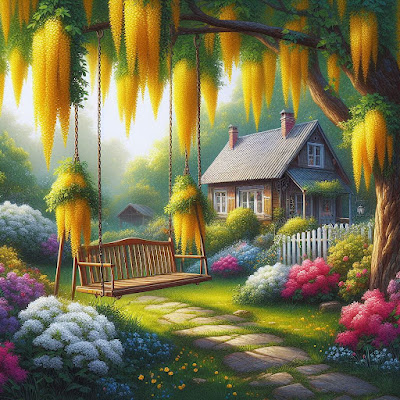Spring The Sweet Spring - Thomas Nashe | BOSEM Class 9 English Literature Reader (Poetry)
Board of Secondary Education Manipur (BOSEM)English Literature Reader (Poetry)Class: IXChapter: 3
Spring The Sweet Spring
Thomas Nashe
Stanza-wise Analysis of the Poem
Spring, the sweet spring, is the year’s pleasant king,
Then blooms each thing, then maids dance in a ring,
Cold doth not sting, the pretty birds do sing:
Cuckoo, jug-jug, pu-we, to-witta-woo!
The initial stanza describes the beauty of nature in the spring season. The poetic voice personifies spring as "the year's pleasant king" and emphasises its sweetness and unique qualities in contrast to the other seasons. It highlights how spring stands out from the rest, with everything blooming, people being happy and joyful, and nature at its most beautiful. The absence of cold weather and sadness is noted, while the singing of birds symbolises optimism and fulfilment. The stanza concludes by evoking the songs of various birds, including the cuckoo, nightingale, lapwing, and owl, capturing the essence of the spring season with vivid pastoral imagery.
The palm and may make country houses gay,
Lambs frisk and play, the shepherds pipe all day,
And we hear aye birds tune this merry lay:
Cuckoo, jug-jug, pu-we, to-witta-woo!
The second stanza continues to depict the beauty of nature in spring. The mention of "palm and may" symbolises spring festivities using synecdoche, where a part represents the whole. These celebrations bring joy to the people, signify a fresh beginning, and enliven "country houses". In this pastoral setting, young lambs "frisk and play", evoking a sense of excitement and vitality.
(synecdoche: Substituting a more inclusive term for a less inclusive one or vice versa)
Furthermore, there is an atmosphere of joy as rural dwellers sing ("the shepherds pipe all day"). The entire community appears to be full of merriment and delight because of the arrival of spring. Once again, the birds chirp their cheerful tunes ("And we hear aye birds tune this merry lay"). Similar to the previous stanza, the chorus is introduced as the birds' song in the final line.
The fields breathe sweet, the daisies kiss our feet,
Young lovers meet, old wives a-sunning sit,
In every street these tunes our ears do greet:
Cuckoo, jug-jug, pu-we, to witta-woo!
Spring, the sweet spring!
The final stanza introduces the symbolic meaning of spring. The lyrical voice expresses that "The fields breathe sweet". This personification of the countryside suggests that nature is rejuvenated by the fields and the flowers within it, as indicated by "the daisies kiss our feet". The countryside is portrayed as an idyllic place accessible to all, from "Young lovers" to "old wives". By mentioning the young lovers, the lyrical voice connects spring to a time of romantic encounters and heightened emotions. It seems that everyone is affected by this joyful state, as evidenced by the happiness visible "In every street" due to the melodies that "greet our ears".
Solved Textual Questions and Answers
I. Answer the following questions in a sentence each.
1. Which season is the year's pleasant king?
Ans.: - Spring season is the year's pleasant king.
2. What do the maids do in spring season?
Ans.: - In the spring season, the young maidens joyfully dance in a circle, radiating happiness.
3. Who pipes all day during the spring?
Ans.: - During the spring, the shepherds melodiously play music on their pipes.
4. What do the daisies do in spring?
Ans.: - The daisies kiss our feet, indicating that the natural world is rejuvenated by the meadows and blossoms within it.
II. Answer the following questions briefly.
1. Why is spring called 'the pleasant king'?
Ans.: - Thomas Nashe refers to the spring season as 'the pleasant king'. According to him, no other season can compare to the beauty of nature during spring. It is a time when all the flowers bloom, and people are filled with happiness and joy due to the beauty of the spring season.
2. Why does the poet say 'cold doth not sting'?
Ans.: - The poet describes how with the arrival of spring, there is no longer a biting cold, and people are no longer sad. Instead, the birds sing, symbolizing a sense of optimism and fulfilment.
3. What makes the country houses gay?
Ans.: - With the arrival of spring, the country and fields are enveloped by lush palm trees and numerous flowers, swaying in the gentle green breeze. As a result, the countryside appears vibrant and full of life.




Comments
Post a Comment